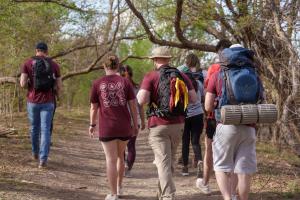Take a hike, but take health safety precautions
Preparation and planning help trips begin and end on the right foot.
If you're dehydrated, your brain and your heart won't be able to function as well, your kidneys won't function as well. That's going to decrease your physical performance on the hike.”
— Dr. Brian Kendall, TTUHSC Emergency Medicine
LUBBOCK, TX, UNITED STATES, June 26, 2023/EINPresswire.com/ -- “Be prepared” is not just the Boy Scout motto¬; it’s sound medical advice for day-hikers. Brian Kendall, M.D., Texas Tech University Health Sciences Center (TTUHSC) assistant professor of Emergency Medicine, said even for shorter hikes, that means having what you need to prevent and handle a variety of medical issues on the trail.
“I think having some basic knowledge before you go: what first aid is, either by watching a YouTube video or taking a class online, learning some of those basic first aid techniques,” Dr. Kendall said. “And then taking some of the supplies that you would need to treat those simple ailments.”
Dr. Kendall said a few essential items can cover a wide range of medical issues day-hikers might experience.
“I have a first aid kit that has a lot of different things in it: lots of gauze, bandages, and Ace wrap. You can use those for a lot of different things like making a sling, bandaging up a wound or helping to splint an ankle or a knee. I also have all sorts of different anti-nausea medicine and anti-itching medicine or cream, things for headaches and those types of things as well.”
Blisters are more than an inconvenience for hikers. They can derail a trek on the trail. Preventive measures include avoiding cotton socks and protecting areas of the foot that are prone to sweat and friction. Duct tape or moleskin are recommended depending on if you’re hiking in wet or dry conditions. If a blister forms, Dr. Kendall advised to cushion it by cutting a hole its size in layers of moleskin pads up to the height of the blister, then cover the whole thing with more moleskin and secure it all with tape.
Some common mistakes hikers make can result in more serious medical problems.
“I think not wearing proper equipment. Not having proper footwear. Not knowing the trail that they're going to be going on and the difficulty level that that trail is going to be. I think not taking water is a big one, too.”
Dr. Kendall stressed hydration before a hike is as important as staying well hydrated during the hike. Water alone is fine for a day hike, but he recommended carrying electrolyte tablets to add to water on longer trips.
“That's what helps your body function at its peak performance. If you're dehydrated, your brain isn't going to be able to function as well, your heart won't be able to function as well, your kidneys won't function as well. That's going to decrease your physical performance on the hike.”
Being prepared for a day hike doesn’t have to weigh you down. Dr. Kendall said the duration, elevation and skill level required for a hike can serve as a guide to what’s necessary to carry in your backpack.
“Something that feels like 10 pounds at the beginning of a hike is going to probably double in weight, just the way it feels by the end of that hike,” Dr. Kendall said. “So, you want to pack as light as you can and take only the essentials. Take that first aid kit, take water and make sure that you have things like sunscreen.”
While backpacks are important, Dr. Kendall stressed backups are, too.
“I think the biggest issue that you can get yourself into the most trouble with is by hiking in an unfamiliar place without somebody else there with you. So always, when you go on a hike, make sure that you go out with a partner and make sure you know where you're hiking. And if there is an emergency that happens, know where you're going to go.”
For on-camera interviews and other news resources, visit this link.
Suzanna Cisneros
TTUHSC
+1 806-743-7605
suzanna.cisneros@ttuhsc.edu
![]()


